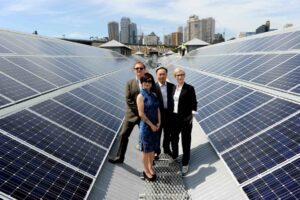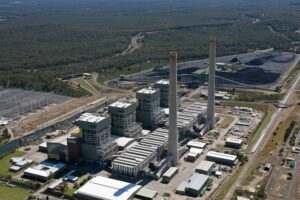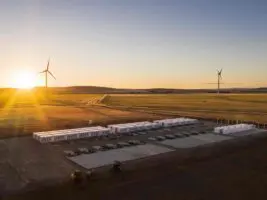 Federal resources minister has surprised no one and used his National Press Club address on Wednesday to “unashamedly” spruik the boundless potential and perceived upside of Australia’s coal mining, export – and burning – sectors; and to decry anyone who should think otherwise.
Federal resources minister has surprised no one and used his National Press Club address on Wednesday to “unashamedly” spruik the boundless potential and perceived upside of Australia’s coal mining, export – and burning – sectors; and to decry anyone who should think otherwise.
Speaking to the audience of journalists, Canavan rolled out all of his tried and true coal myths – including that Australian coal is the answer to alleviating poverty in India. And he even fashioned a few new ones, including that maintaining robust coal, oil and gas mining sectors is somehow something Australia’s indigenous population greatly needs and wants.
Canavan also vehemently denied that the global coal mining and export business was going into decline – as so many of the world’s top energy analysts continue to assert. Rather, he pointed to IEA forecasts, which he said meant Australia would need to “produce more coal that it ever has in its history,” to meet demand.
But the ability to seize that opportunity was at risk, he lamented, from Australia’s political debate on resources “becoming too partisan.”
“We have to work hard to maintain our preeminent position as a mining country and a strong resources nation,” Canavan said. “If we can do that, there will be many more opportunities from a strong resources sector.
“A stronger resources sector would mean more jobs, … more business for other industries across Australia, including tourism. And most importantly, a strong resources sector will help fulfill our promise to our first Australians to give them the economic opportunities that so many of us take for granted,” Canavan said.
“That’s how I will judge whether our resources policy is successful or not. I will judge it not in terms of dollars earned, or the amount of exports we achieve, or even the taxes we get here into Canberra … the way I’ll judge the success of the resources policy of this nation, is how many people it can help, to have a job, provide for their family and carve out a better future for themselves.”
How the coal industry will benefit Australia’s most vulnerable and remote indigenous communities, Canavan did not explain. But it’s worth pointing out most of these will shift from diesel power to solar and battery storage in the not-too distant future – if they are not already.
Canavan also claimed that a majority of the indigenous communities local to the proposed Adani coal mine, in northern Queensland’s Galilee Basin, supported the mega mine going ahead, and that it was just big city dwellers and rich folk from other countries that opposed its development – and used the legal system to try and block it.
“I can’t believe that we sit back and let our judicial system be abused in that way,” Canavan said. “Here we have millions of dollars coming out of the United States… seeking to influence our democratic processes, and what are we doing about it?”
In answer to his own question, Canavan noted that the Turnbull government was currently seeking to get through laws restricting overseas organisations from “jeopardising and compromising our democratic processes.”
And to address the bad rap that he believes the resources sector is getting, Canavan also announced that his department had established a Resources 2030 taskforce, which would address the key priorities of attracting investment. cutting red tape, and “bolstering community support” for the sector.
Why this is necessary when, according to Canavan, “80 per cent of people agree with coal” in Queensland, and a further 60 per cent support the development of the Adani coal mine, is unclear.
Finally, when asked by The Guardian’s Katharine Murphy whether he felt a responsibility, in his portfolio, to prepare people for the global low-carbon transition that’s coming, given Australia is a signatory to the Paris climate agreement, Canavan had this to say:
“I find it highly objectionable to talk about people’s loss of jobs and livelihoods as a transition. Let’s be frank, that’s a euphemistic term. That’s a term to try to hide … what will be the real impacts of that…
“For many thousands of businesses and people in central and north Queensland and (the NSW) Hunter Valley, it won’t be a transition, it will be utter heartbreak.
“I don’t like the term transition, let’s be frank. If you want to shut down the coal industry and cost people jobs, say it. Have the guts to say it.
“I also … absolutely contest that the coal industry …. is inconsistent with the obligations we’ve got to reduce carbon emissions,” he added.
“The coal industry is certainly not inconsistent with the Paris Agreement, because we’ve got 14 countries that … are saying that their plans to reduce their emissions include investing in the advanced HELE coal-fired power stations.
“They’re going to meet their commitments under Paris by investing more in coal, because they’re going to invest in cleaner coal technologies that burn coal at higher temperatures, and therefore generate fewer emissions,” he said.
“We should be thinking of …the smart ways to respond to climate change. Thinking about what we can do to continue economic growth and lower carbon emissions. Not locking ourselves into this narrow view that it must be renewables, or something else, not coal and not oil and not gas.
“I mean … I agree with Deng Xiaoping; it doesn’t matter if it’s a black cat, a yellow cat or a white cat, as long as it catches mice. And the coal industry, and the technologies that are coming out of the coal industry, are going to be able to catch mice.
“They’re going to be able to lower emissions. They’re doing that already. And it seems strange that a country that gets so much from the coal industry, would be taking such an anti-technological anti-science approach.
“I stand on a platform that is unashamedly pro-coal. I got elected on that basis.
“Unfortunately, there’s a very small minority voice… a small, loud minor voice that want to dictate to the rest of the country their view.
“Well I think, it would be better …to listen rather than lecture. … rather than take the propaganda that is coming out of other countries and of major cities that would like to turn people out on the street.”








